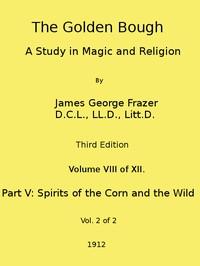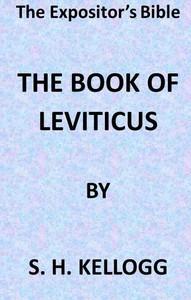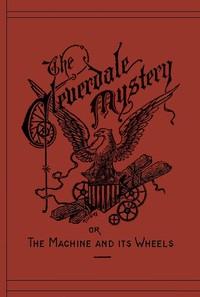|
|
Read this ebook for free! No credit card needed, absolutely nothing to pay.Words: 12551 in 3 pages
This is an ebook sharing website. You can read the uploaded ebooks for free here. No credit cards needed, nothing to pay. If you want to own a digital copy of the ebook, or want to read offline with your favorite ebook-reader, then you can choose to buy and download the ebook.

: The Golden Bough: A Study in Magic and Religion (Third Edition Vol. 08 of 12) by Frazer James George - Religion; Magic; Superstition; Mythology@FreeBooksWed 07 Jun, 2023 THE DIVINING ROD: VIRGULA DIVINA--BACULUS DIVINATORIUS BY CHARLES LATIMER, CIVIL ENGINEER. CLEVELAND, O, FAIRBANKS, BENEDICT & CO., PRINTERS, 1876. AN ESSAY READ BEFORE THE CIVIL ENGINEERS' CLUB OF THE NORTHWEST, AT CHICAGO, FEB. 1, 1875. PREFACE My Essay on the "Divining Rod," having proved interesting to a number of my friends, I have concluded to give it to the public, with the hope that some useful practical results may be derived from it. I have no apology to make for presenting this subject in a serious light. I regard it as one strictly in the domain of science, and, therefore, worthy of the consideration of scientific men. I have no fear of ridicule, knowing for myself and "not for another," that what is here presented is the truth. To those who seek absolute truth, I need not recommend a reading of these pages. To those who merely live by science, drawing their sustenance from it as from the "convenient cow," as Goethe says, I will simply say, imprison yourselves, gentlemen, in your shell; the world will move quite as well without you. I add a number of notes from various sources to which I had not access before writing my own experience. ABOUT "WATER-WITCHING." I have always observed that when any novelty is presented for the consideration of man, which is not readily proven by already well known scientific laws, or which may not be demonstrated by the knowledge and power of most persons, it is found extremely difficult, if not impossible, to gain the attention of the devotee of science. Whether, indeed, it be from lack of interest, from incredulity, or from the fear of ridicule, or from any other cause, we look with distrust upon anything which is not in harmony with our preconceived ideas or theories, and we are apt to raise the cry of humbug or superstition, and reject, with a contemptuous assumption of superiority as unbelievers, propositions which properly put to the test might prove of value to mankind. Happily for us a wise Providence has not ordained that all minds shall plough in a single furrow of the great field of knowledge. Some, therefore, believe nothing but what they see, and frequently doubt the evidence of their own senses. Others believe everything they see and nearly everything they hear, and seize with too great credulity upon every new thing presented to them. There are others who disbelieve nothing that is presented to them, however apocryphal, without full and impartial investigation, aided not by testimony alone, but by actual demonstration. Again, there are men who are afraid to investigate, lest the world should call them visionary; these are always prepared to apologize for examining anything outside the mere routine of their special science. But the most frequent error of mankind is to doubt and ridicule, without investigation, everything which is not commonly received. To such I would cite the pungent words of Solomon: "He that answereth a matter before he heareth it, it is a folly and a shame unto him." Free books android app tbrJar TBR JAR Read Free books online gutenberg More posts by @FreeBooks
: The Expositor's Bible: The Book of Leviticus by Kellogg Samuel H Samuel Henry Nicoll W Robertson William Robertson Sir Editor - Bible. Leviticus Criticism interpretation etc.; Bible. Leviticus Commentaries@FreeBooksWed 07 Jun, 2023

: The Cleverdale Mystery; or The Machine and Its Wheels: A Story of American Life by Wilkins W A - Detective and mystery stories; New York (State) Fiction; Political corruption Fiction@FreeBooksWed 07 Jun, 2023
|
Terms of Use Stock Market News! © gutenberg.org.in2025 All Rights reserved.






